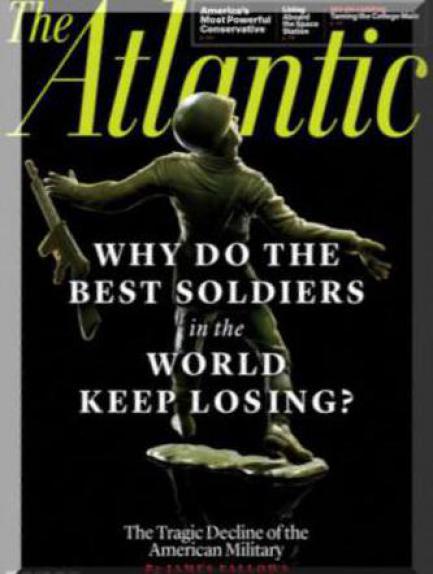In previous documents I pointed out that if we can provide
ourselves with competent leadership, then we could take control of our
economy. This would allow us to make intelligent decisions on which research
projects to fund; which products and services to develop; and what features
to give our products.
In this document, I will use bicycles as an example of how the free
enterprise system cannot provide us with sensible products because the
businesses must compete for the attention of consumers. They focus on sales,
not on the value of their product. They focus on pleasing us, which
might seem wonderful, but what pleases us is not necessarily what is best
for us.
Your interests in life are
influenced by your environment
Before I begin, in case you do not have an interest in bicycles,
you should keep in mind that your lack of interest may simply be due to
the fact that the free enterprise system is not providing you with a bicycle
that you enjoy, and/or you do not enjoy riding bicycles in your city.
In a previous document, I pointed out that if we were to create some
new cities and experiment with our culture, the people in that city should
be prepared for the possibility that some of them will want to form new
friendships or marriages. Now consider that the people in that new city
are also likely to discover that many of them want to change some or all
of their leisure activities.

For example, some of the people who have no interest in bicycles
may discover that they enjoy an occasional bicycle ride when they live
in a city that provides them with free and easy access to a lot of beautiful
bicycle paths, and free access to comfortable bicycles. Some of them might
also enjoy an occasional ride on a quadcycle with their family or
friends.
For another example, some of the people who are currently disgusted
with the government and who ignore society are likely to discover that
when they live in a city in which they enjoy the people and respect the
government, they enjoy getting involved with some aspect of society, such
as the holiday celebrations, museums, recreational activities, children's
activities, or botanical gardens.
Don't assume that you know what you want from life. When you make decisions
about what to do with your future, consider that what you like and dislike
in regards to hobbies, products, recreational activities, and social activities
is influenced by your environment; mainly the people you live with and
the culture of your society, and to a lesser extent, the weather, the city,
and the products and services that are available to you.
If you had been born 10,000 years ago, you would have spent your life
just like other primitive savages. If you had been born 10,000 years in
the future, you would be involved with activities and hobbies that we cannot
imagine. You don't need any particular material item or activity in order
to enjoy life. Life is like a giant smorgasbord, and there are lots of
aspects to enjoy.
For another example of how your leisure activities might change, many
people have a botanical garden in their city, but not many people want
to drive through traffic and then pay a fee to look at a garden. However,
if they were living in a City of Castles, every cluster of apartment buildings
would be surrounded by free parks and gardens. When people only have to
take a few steps outside of their building to be in a park, many people
would discover that they enjoy occasionally walking or riding a bicycle
through it.

By extending elevated foot paths out into ponds, people would
be able to walk out onto the ponds without getting wet. Many people who
currently have no interest in visting ponds are likely to discover that
when they have free and easy access to these ponds, they may enjoy occasionally
taking a walk out onto one of the ponds and getting a close look at the
plants, ducks, and fish.
Many Americans want a large house, several large televisions in different
rooms of the house, pet doors for their dogs and cats, and high-speed Internet
for video games. They assume that they enjoy spending a lot of leisure
time inside their house, but if all of us could experience a variety of
different types of cities, economic systems, and government systems, we
would discover that our leisure activities change according to the environment
we live in.

Some of the people who have no interest in swimming are likely
to discover that they enjoy it once in a while, including at night, when
they live in a city in which they have free and easy access to beautiful
pools, and when they are living among people they enjoy.
Some of the people who have no interest in 3-D printers, bonsai trees,
pottery, telescopes, electron microscopes, or CNC wood routers, might discover
that when they live in a city that supports a wide variety of free social
clubs, and when they enjoy the people in the city, they enjoy occasionally
visiting one of the clubs to learn about and experiment with those items,
and they may want to join some of the clubs.
When we are young, we tend to develop goals for ourselves, such as buying
a big house, flying an airplane, or becoming an athlete. We assume that
we must accomplish those goals in order
to be happy, but in reality, we can enjoy life in a lot of different ways.
Analyze
problems, don't ignore
them or become angry
Animals react to problems by either becoming angry or by running
away, and people have the same tendency. If we don't like bicycles, we
have a tendency to ignore them. If we don't like the government, we tend
to either ignore the government or become angry with it.
A more sensible reaction in this modern world is for people to analyze
our problems. If you do not like bicycles, for example, you should
wonder why not. Is there a way to design them so that they become
more appealing to you? Or is it because you don't like riding a bicycle
in your city? Is there a way to design a city so that you enjoy riding
a bicycle?
Likewise, if you don't like the government, schools, holiday celebrations,
city parks, or museums, don't ignore the problem or become angry at somebody.
Instead, analyze the situation. Why don't you like it? Is there some way
that we can change it to make it more appealing to you?
Imagine living in a city in which people have that attitude. In such
a case, when people get together for lunch or social activities, they would
occasionally discuss what they do not like about bicycles, the government,
the holiday celebrations, the public swimming pools, the city festivals,
the museums, and the school system. They would also discuss what type of
changes might improve the situation. Through the years, these type of discussions
would result in some intelligent ideas on what to experiment with.
Engineers and scientists are following this philosophy in regards to
technical issues. They occasionally discuss what they dislike about a cell
phone, 3-D printer, or robot, and they discuss possible solutions to the
problems. They don't ignore the problems or hate somebody. As a result,
they bring us improvements every year. However, we are not yet applying
this philosophy to social issues. We are not yet making any attempt to
improve our holiday celebrations, recreational activities, economic system,
or government system.
For an example of how this change in attitude can result in improvements
to society, consider that millions of people live in an area where the
trees in the forest change color during the autumn, but not many of those
people are interested in walking through the forests and enjoying the beauty.
If they were to discuss what they do not like, and if they were to devise
possible solutions, they might discover that they would enjoy the forests
if they could see the forests in their wild, natural state but without
stepping in the mud, slime, and snails. They might realize that by creating
elevated
foot paths and bicycle paths, we leave the forest in its wild state, and
we will be able to enjoy the forest without getting filthy.

Humans have the intelligence necessary to design bicycles,
parks, swimming pools, cell phones, holiday celebrations, and other products
and activities according to what will provide us with the most pleasant
life rather than what will make a business the most profit. However, it
requires changing our attitudes towards life and experimenting
with an alternative to the free enterprise system.
The free enterprise system is giving us a wide variety of products and
services, but they are all designed to make profit rather than to
provide us with some true benefit. The free enterprise system is also interfering
with our holiday celebrations, universities, and museums because businesses
want to profit from those activities. We would create a more pleasant life
for ourselves if we took control of society and created products and cultural
activities according to what will bring us the most benefit.
“Supercharged bicycles”
The free enterprise system provides us with products that titillate
our emotions, but we do not necessarily benefit from products that we enjoy.
It is easier to understand this concept with products designed for children,
so before I discuss bicycles for adults, consider how free enterprise is
providing children with silly and dangerous bicycles.
To a child, a bicycle is both a transportation device and a recreational
device, so we should design their bicycles according to what will provide
them with the best transportation and recreation, and in a safe manner.
Unfortunately, businesses are in competition with one another to attract
the attention of children, and so they focus on designing bicycles that
appeal
to children rather than to provide children with the greatest
benefit.
For example, preteen boys enjoy playing in the dirt and mud, and they
are titillated by the off-road, MX motorcycles. Bicycle companies respond
by designing bicycles that resemble MX motorcycles. They call them "BMX"
bicycles. Some of BMX bikes take the imitation to such an extreme that
they have decals on them that say such things as "supercharged" and "nitro."
And some of the boys occasionally make motorcycle noises as they ride their
BMX bicycles.
Bicycle companies and parents might respond that the children enjoy
those BMX bicycles, but we should not provide children with products simply
because they enjoy them. We should analyze each product to determine
whether it is providing benefits that outweigh the disadvantages. Children
enjoy candy, but that doesn't justify giving it to them, especially not
in whatever quantities they want. Men are titillated by pornography, but
that doesn't justify allowing businesses and media companies to saturate
society with sexual titillation in advertisements, tradeshows, television
programs, and retail stores.
Imagine if two cities are identical in all respects, except that one
city has a free enterprise system and is selling BMX bicycles to the boys,
and in the other city, the bicycles are designed in a more serious manner
for transportation and recreation. How would life be different for the
boys in those two cities? Would the boys who have supercharged, BMX bicycles
have a more pleasant childhood or become better adults? Not necessarily.
We might discover that the boys in the free enterprise system are injuring
themselves more often and irritating adults on a regular basis. Also, even
though the children wear helmets when they do stunts on bicycles, they
may be suffering from brain damage as often as football players, boxers,
and other people who have their brains knocked against their skull.
|
 |
|
Do these bicycles make life better for young boys?
Or do they encourage idiotic, dangerous, and irritating behavior? |
 |
|
By comparison, the boys in the other city would be provided
with bicycles that were designed for safe and reliable transportation and
recreation. Instead of using bicycles to imitate motorcycles or do stunts,
they would use bicycles to explore the parks, lakes, and city. In addition
to remaining in better health, those boys might develop better attitudes
and behavior.
Furthermore, their memories of childhood might be more pleasant because
instead of accumulating thousands of miserable memories of pain and injuries,
broken bones, hospital rooms, and having dentists fix their broken teeth,
they will have lots of nice memories of riding bicycles with their friends
and exploring the city.
How do we improve life for
children?
Most people assume that happiness comes doing whatever pleases
us and avoiding whatever we don't like. This philosophy causes people to
seek emotional titillation with food, material items, fame, sex, babies,
and drugs, and it causes people to avoid whatever they don't receive pleasure
from, such as being responsible, learning, working, cleaning up after themselves,
and being considerate.
Parents who follow that philosophy assume that they will provide their
child with the best life by giving him as much freedom as possible to do
as he pleases, and by giving him lots of material items, pampering, and
praise. However, when I look back at my childhood, the pleasant memories
that are still with me have nothing to do with freedom, gifts, pampering,
or praise. The only exceptions are a few memories of getting candy.
Aside from candy, my most pleasant childhood memories are of doing things
with people, such as exploring the nearby creek with other boys, or doing
things with my mother or father. For example, on a hot summer afternoon,
me and my siblings were playing in our backyard, and my mother cut a watermelon
into pieces and brought the pieces out for us to eat. Eating watermelon
with her meant more to me than getting a Christmas gift.
Since each person has slightly different emotional and intellectual
characteristics, there will be subtle differences in what each of us enjoys
about life. For example, if a child doesn't have as much of an interest
in other people and is more focused on himself, then when his mother provides
watermelon for him and other children, he may focus on enjoying the watermelon,
not on enjoying the people. When he gets older, he may have a lot of memories
of eating food, but not many memories of the people that
he ate with. His memories of Christmas and birthdays might be of getting
gifts
rather than the people he was with.
I have heard some parents justify giving their children enormous amounts
of toys and other items on the grounds that they don't want their children
to suffer the type of childhood that they suffered from. Apparently, those
people had strong cravings for material items when they were children,
and that caused their childhood to be a nearly constant state of envy,
misery, pouting, or frustration. Those parents say that they don't want
their children to "want things". They assume that providing lots
of material wealth to a child will prevent the child from wanting things,
thereby making him happy, but that is nonsense.
Whether a child is satisfied with his material wealth has nothing to
do with how much wealth he has. Whether a child suffers from "poverty"
depends upon the emotional and intellectual characteristics of the child.
All of the children in a particular neighborhood are very similar to one
another in regards to their level of material wealth, but they are not
equal in regards to their satisfaction with their material wealth. At one
extreme are the children who are so satisfied that they don't ask for anything
more, and at the other extreme are the children who are constantly whining
for more items, and are willing to steal, cheat, and manipulate in order
to get more.
When children grow up, their mind changes, but their personality remains
the same. Children who were satisfied with their material wealth as a child
will likely be satisfied with whatever they have as an adult, and the children
who were whining and stealing in order to get more items are likely to
become adults who whine and steal.
The same situation occurs with food. Some children are satisfied with
an adequate amount of food, whereas others - especially those who suffer
from Prader-Willi
Syndrome - whine for more, and some take food from the kitchen when they
are not supposed to.
It is easy for people to understand that a child has a problem if he
cannot be satisfied with an adequate amount of food, but we don't want
to apply that concept to adults who have extreme cravings for material
wealth, status, sex, or babies.
I think the reason every society is promoting the philosophy that material
wealth brings happiness, and the reason that we admire billionaires
rather than consider them analogous to obese people, is because
most people have trouble controlling their cravings for material items,
and since humans are very arrogant, each of us prefers to assume that our
particular cravings are normal and healthy. We want to be the standard
to judge other people. The people who have intense cravings for material
items want to believe that it is normal for people to have insatiable cravings
for material items. They don't want to think of themselves as having low
self-control, or being neurotic, or being like an animal.
If we had proper leadership, our leaders would encourage us to keep
our emotional cravings under control, but in a free enterprise system,
businesses have no desire to set a good example for us. Instead, businesses
take advantage of our craving for material wealth by offering us products
that they imply will make our lives better.
The businesses are encouraging the craving of material items
rather than encouraging people to control themselves. Businesses
do the same with food. Rather than encourage us to eat a proper diet and
eat in moderation, they compete with one another to titillate us with new
food products. They also compete with one another to titillate children
with candies, cereals, and other food products.

The businesses do not make anybody become obese or eat
candy, but if we had a better understanding of the human mind, I suspect
that we would come to the conclusion that the manipulation and emotional
stimulation by businesses is detrimental,
especially to the people who have the least self-control. Children cannot
think very well, or control themselves very well, so by stimulating children's
emotions, businesses are causing them to develop idiotic cravings for particular
foods, clothing items, and toys.
Businesses have no desire to encourage children to behave in a sensible
manner. They want to manipulate children into purchasing products. This
not only causes the children to develop idiotic cravings, it irritates
their parents because their parents have to deal with the irrational demands.
Furthermore, the businesses are often selling products to children that
encourage infantile or obnoxious behavior, such as riding skateboards on
public handrails. This results in children being an irritation to all of
society.
I suspect that we will create a noticeably more pleasant society, and
noticeably better behaved children, when we prohibit businesses from manipulating
us, and when we design children's products to have some sensible value
rather than merely titillate them. Unfortunately, there is no way to make
these changes in a free enterprise system. We must be willing to experiment
with new economic and government systems.
“Farm fresh bicycles”
These concepts apply to adults, also. For example, when businesses
sell eggs, they describe their eggs with such phrases as "farm fresh"
and "all-natural". According to this
article, none of these phrases have any meaning. They are just advertising
slogans.
What is the difference between describing eggs as "farm fresh" and describing
a bicycle as "supercharged"? I don't think there is a difference. Both
descriptions are attempts by businesses to manipulate us.
Businesses do not treat us with respect. Instead, they treat us like
stupid animals who can be manipulated with emotional stimulation. The reason
they do this is simply because they have learned through trial and error
that consumers resist thinking and research, and that the easiest way to
sell a product is to titillate the emotions of consumers. As with animals,
our natural tendency is to follow our emotional feelings rather than think.
As a result, businesses don't bother providing serious information about
their products. Instead, they focus on attracting our attention with advertisements,
pretty women, packaging, and celebrity endorsements.
The marketing and advertising departments of a business are constantly
doing research and conducting experiments, but not to figure out how to
make products more beneficial to us. Rather, they are trying to figure
out how to convince us to purchase their products.
If a bicycle company were to describe one if its bicycles as "farm fresh
and 100% natural", most people would probably be able to figure out that
the company was trying to manipulate us. However, businesses do not use
such obvious methods of manipulation. Instead, they test their advertising
slogans and select only those that are subtle enough to fool us. The reason
we don't usually notice the manipulation is simply because businesses use
only the techniques that have been proven to work.
A free enterprise system provides us with a phenomenal variety of products
and services, and businessmen are essentially on their hands and knees
and offering to serve us. Consumers are treated like Kings and Queens.
This creates the illusion that we have lots of wonderful products to choose
from, and that businesses love us.
Furthermore, there are a few business
owners and executives who truly do want to do something useful for society,
and since we have a tendency to believe whatever we want to believe, we
have a tendency to assume that those people are typical
of businessmen. In reality, most businessmen seem to be more concerned
with money than in improving our lives.
It is difficult for us to notice the problems of a free enterprise system
because we don't have any other economic system to compare it to, except
for communism, which is obviously much worse. This can lead us to the conclusion
that we have the best economic system possible.
However, if the world were to follow my suggestion and let each city
be culturally independent, then different cities would be able to experiment
with different economic systems, school systems, holiday celebrations,
and other culture, and that would make it easy for us to notice that life
in some cities is more pleasant than in others. For some examples of how
a city without a free enterprise system might be different:
• We would notice that the city does not have "farm fresh"
eggs or "supercharged" bicycles. We would notice that their foods, bicycles,
cell phones, computers, and industrial items are designed and presented
in a more serious manner.
• We would notice that the children spend less time whining for toys,
candy, and clothing items.
• We would notice that the pharmaceutical companies do not advertise
their drugs, and so the doctors do not have to deal with patients who have
been convinced that they need a particular drug.
• We might also notice that the men and women have slightly better relationships
when the people are not exposed to daily sexual titillation in advertisements
and television programs.
When cities are allowed to be different, it makes it easy for us to compare
life in the different cities, and that would help us to realize that businesses
in a free enterprise system are abusing and manipulating us, and that many
of our products are silly, idiotic, or dangerous. We would notice that
the behavior of adults and children is better in cities that don't have
a free enterprise system, and we would come to the conclusion that the
free enterprise system encourages crude, emotional behavior. The free enterprise
system encourages everybody to please themselves rather than think about
what makes the most sense for them.
Until we do these type of experiments, we cannot know for sure how to
provide ourselves with the most pleasant life. A person is an arrogant
fool to assume that he is such a super genius that he can figure out what
is best for the human race. We need to experiment with our government system,
economic system, holiday celebrations, jobs, schools, and other culture,
and we need to allow different cities to do different experiments. We should
control our arrogance and refrain from trying to force other people in
the world to live, eat, dress, and behave exactly like us. We should try
to learn from one another rather than
stand on a pedestal and tell other people to follow our orders.
Bicycles are designed to
sell,
not to improve our lives
In this document, I will show you that businesses are giving
us bicycles that appeal to the emotions of consumers, but we would be more
likely to use and enjoy bicycles if they were designed in a more serious
manner, and if we designed our cities for bicycles. Three of the reasons
why it is idiotic for businesses to design bicycles according to what consumers
want are:
1) Consumers are ignorant about bicycles
Most consumers do not have much technical information about bicycles,
and so they make decisions according to their emotions, common sense, and
intuition. For example, our common sense tells us that weight
is the most important aspect of a bicycle, and this results in consumers
who want a lightweight bicycle. Businesses respond by providing us with
bicycles that have been stripped of unnecessary weight, but as I will show
in this document, weight is less significant to a bicycle, automobile,
and other transportation devices than tires and air resistance.
2) Men want to show off
Male animals try to impress both male and female animals with their
physical strength and stamina, and male humans have the same cravings.
Men like to believe that they are powerful athletes who can ride bicycles
at high speed. They want to show off their amazing physical abilities and
impress other people. When we select products, we are concerned about how
it will affect our image and status.

For example, when I was in high school, most of us boys were
embarrassed to have chain guards or fenders on our bicycles because those
accessories were considered to be for sissies or women.
We also wanted the 10-speed race bikes rather than a standard bike so
that we could create the impression that we were physically active and
athletic. The standard bike, in which a person sits upright, was considered
for women and weak men.
When businesses produce products for men, they frequently design them
in an irrational manner simply so that the men can imagine that they are
special people. We could describe such items as "status products" because
the men want them mainly to feel important and show off rather than because
they want the function of the product.
Businesses that produce status products are not making our lives
better; rather, they are exploiting our cravings for status. Instead
of encouraging men to control their crude cravings, businesses are inadvertently
encouraging us to act like animals. I think that if there were two cities
that were identical in all aspects, except that one city did not produce
any status items, the men in that city would have slightly more sensible
behavior overall.
3) Consumers tend to mimic other people
 |
| The "Goths" and other rebels are as sheep-like and arrogant
as the majority of people. |
People, especially women and children, have a strong tendency
to make decisions about products according to what their peer group is
doing, and what the celebrities are endorsing. When businesses produce
items to appease those people, they often create products that are desirable
only for a few months or years, and then are replaced by some other silly
product that happens to be the next latest craze.
It is interesting to note that some people boast that they do not
mimic the latest fashion craze. They claim to be independent people
who ignore the majority of people and the celebrities. Ironically, those
people are just like everybody else. Specifically, they are just as arrogant
as everybody else, which is why they boast about their independence, and
they mimic other people, just like everybody else. The only difference
between them and us is that they mimic a small group of people rather than
the majority of people.
If the majority of people were making wise decisions, then it would
be acceptable to advise children to follow the majority, but the majority
of people are ordinary, and half the population is below average, so it
is foolish to follow the majority of people. When businesses produce items
to appease the people who follow the latest fashion trend, the businesses
are encouraging more of this idiotic, sheep-like behavior rather than encouraging
people to make wise decisions about products.
Some people might respond that they enjoy following the latest fashion
trend, but do they really? If they could experience life in a more sensible
economic system, they might discover that they prefer a society in which
the products are designed in a more in intelligent manner.
We should counteract peer
pressure and embarrassment
If we take control of our economy, we can do what makes the
most intellectual sense for society. For example, we can decide which,
if any, status products to produce, and we can design products according
to what will be the most beneficial to us, even if some people are embarrassed
by them.
In case you wonder what I mean by people being embarrassed by a product,
consider the issue of safety glasses. In a free enterprise system, businesses
compete with one another to design safety glasses that appeal to consumers.
If consumers would make wise decisions, then the businesses would compete
to develop the most practical and comfortable safety glasses but, unfortunately,
most consumers tend to follow their emotional cravings.
 |
| These type of safety glasses are only useful for objects
that are coming directly at our eyes. |
Since we have a strong craving to look attractive, we have
a tendency to choose safety glasses according to how it will affect our
visual appearance, rather than the comfort or function of the glasses.
The end result is that businesses are under pressure to make safety glasses
that consumers consider to be attractive, rather than glasses that provide
the greatest eye protection and comfort. A common style of safety glasses
is seen in the image to the right. Unfortunately, that style provides protection
only for items that are flying towards the face.
Years ago I met a man who suffered a permanent eye injury because he
was wearing that style of safety glasses. He was working in a factory,
and he had his back to an employee who was on the other side of the room
and using an industrial wire wheel to clean a metallic object. One of the
wires came off the wheel, flew across the room, ricocheted against the
inside of his safety glasses, and penetrated his eye. He did not go blind,
but he suffered permanent eye damage as a result. In his particular case,
the safety glasses caused an eye injury rather than protect
him from injury.
Most of the people who need safety glasses need protection from all
directions, but most people have a tendency to select safety glasses that
resemble prescription glasses or sunglasses. If objects are coming from
the side or behind the person, those type of glasses can make the situation
worse by acting like a scoop that collects flying objects.
In a free enterprise system, consumers are allowed to decide for themselves
if they want safety glasses, and if so, which style. Since people tend
to follow their emotions, they worry about what other people will think
about the glasses, so they have a tendency to select glasses according
to their visual appearance rather than their function or comfort.
|
 |
|
Most of the factory workers who need safety glasses should have protection
from items coming from the side and the back, such as these 4 styles. |
 |
|
 |
|
We need to design safety glasses according to their value to us,
not according to what other people are going to think about us. |
 |
If we switch to an economic system in which the government
makes decisions about products, then we don't have to be concerned about
what consumers want or are embarrassed by. We don't have to appease the
men who want to create the impression that they are strong, tough, and
courageous. We can instead focus on what consumers truly benefit from.
Our government and business leaders would be able to analyze eye injuries
and make intelligent decisions about which style of safety glasses has
been providing the best protection, and which glasses are the most comfortable,
and which jobs require protection from the side and the back. They might
come to the conclusion that there is no sensible reason to produce safety
glasses that provide protection only from the front.
They would also have no reason to produce "economical" safety glasses.
In a free enterprise system, businesses can profit from producing inexpensive,
low quality variations of products, but when the government is in control
of the economy, there is no sense in putting labor and resources into a
product that doesn't truly give us what we need.
With the government in control of the economy, the government would
produce a variety of practical and comfortable safety goggles for different
purposes. They would want the glasses to be visually appealing, but their
primary goal would be function and comfort. We might be embarrassed to
wear the safety glasses, but when everybody is forced to wear one of the
same embarrassing styles, everybody becomes equal. There will be
no peer pressure to wear "fashionable" safety glasses.
Businesses should appease
government officials, not consumers
In a free enterprise system, the successful businessman does
whatever consumers want with little or no regard for whether his products
are practical, functional, reliable, or useful. When government officials
make decisions about products, the businessmen would have to impress the
government officials rather than the consumers.
Once again I will remind you that my suggestions are not as bizarre
as they might seem. The concept of a small group of leaders making decisions
about products for the entire organization has already been proven to
work. For example, our military is following this type of economic
system. When the military wants to purchase equipment or supplies, they
do not let the soldiers make their own decisions about which products to
purchase. Instead, a small group of military leaders makes decisions. Those
military leaders even select clothing and food items for the soldiers.
When businesses want to sell products to the military, they must impress
a small group of military leaders, not a large group of soldiers. The engineers
do not design military products in an attempt to attract the attention
of soldiers. Rather, they design products to appease a small group of military
leaders. The military leaders do not want "economical" products, either;
rather, they want products that are functional, easy to maintain, and easy
to use.
The soldiers are denied the freedom to choose their own products and
supplies, but they are not suffering from their lack of freedom. Actually,
they benefit because if they had the freedom to choose their own products,
they would often make stupid decisions, and they would also make decisions
that are incompatible with the other soldiers.
As I write this document, January 2015, the problems with the F35 aircraft
are frequently in the news, so I suppose some people will respond that
the military has often made dumb purchasing decisions, and that there has
been a lot of corruption with military contracts. Yes, the military has
made bad decisions, but those problems do not prove that this system is
invalid. Rather, those problems support the suggestions I have made in
other documents.
For example, we should remove the secrecy that we are providing
people in leadership positions so that we can see who is making decisions,
and what their reasoning is. That will allow us to
pass judgment on
which of our leaders are making the worst decisions and should be replaced.
We should also stop being so tolerant of criminal behavior among
people in leadership positions.
Who is responsible for the
problems with the F35?
In 2001, the US Military gave Lockheed a contract to produce
the F35 aircraft. It was supposed to be operational by now, but there are
some estimates
that it will not be finished until 2019. The aircraft is also turning out
to be significantly more expensive than original estimates. Some people
also complain that even though it will have some advanced features, it
will be inferior overall to existing military aircraft.
 |
| The F 35 can fly, but will it be useful? |
The news articles that describe the problems with the F35 tend
to imply that the military is to blame, but I would say that the military
is the least guilty. I would say that the people who deserve most
of the blame are the business that made promises that they cannot
fulfill.
If you are confused by this issue, remember what I mentioned in previous
documents; namely, when you are confused by world events, try to imagine
the same event on a smaller scale, such as a family. A nation, business,
and military is an organization of people, just like a
family.
So, imagine that you and your family are living in a typical house in
a typical neighborhood. Imagine that you read an article about solar power,
and you decide to switch your house to solar power for both electricity
and heating. However, assume that you are wealthy, and that you don't want
an "ordinary" solar powered home. Instead, you ask for a much more advanced
system. You contact a few different companies that offer solar power conversions,
tell them what you want, and ask how much it would cost.
 |
| Are you to blame
if a business fails to deliver on their promise to convert your home to
solar electricity? |
After analyzing their proposals, you decide to give the job
to the Lockheed Solar Company. Unfortunately, when they are supposed to
be finished with the job, they are only half finished, and they demand
a lot more money to complete the job. Is it your
fault that the company cannot deliver on their promises? Is it your fault
for asking for something that is too technically advanced? Or should the
business
be blamed for agreeing to take on a project that they could not handle?
Should the business be blamed for not having a good understanding of their
abilities?
Or imagine that you hire a company to do some remodeling for your home,
or you hire a gardener to do some yard work. If the business cannot deliver
on their promises, are you to blame?
In a free enterprise system, businesses are in competition to sell
products. They are not in competition to provide the most sensible
products, or to provide the most sensible advice to customers. Businesses
are rewarded
only for selling products, and they are not
penalized if they fail to deliver on their promises, or if consumers become
disgusted with their products and toss them in the trash.
Because the emphasis in a free enterprise system is on sales,
the advertising and marketing departments of a business are its most important
divisions, and the people in those divisions tend to make more money than
the engineers, assembly-line workers, and technicians.
When Lockheed hires engineers or technicians, they demand that those
people have skills and know what they are doing, but when they hire salesmen,
they don't care whether the salesmen have any understanding of the products
they sell. Salesmen do not get much training, either. Not many companies
even care if a salesman has a criminal history. People are given jobs in
the sales, advertising, and marketing according to their ability to sell
products, not according to their ability to give
sensible advice
to potential customers.
In a free enterprise system, a salesman is not rewarded for being
honest or giving sensible advice to customers. He is rewarded only
when he makes a sale. They are under pressure to sell items.
In a free enterprise system, there are no repercussions for a salesman
who makes a promise that is difficult or impossible for the company to
keep. Actually, the salesman is rewarded with a bonus, and if he
promises something that is difficult to deliver, the executives simply
put more pressure on the engineers and technicians to put more time and
effort into completing the job. Instead of holding the salesman accountable
for his incompetence and deception, the engineers and technicians must
fix the problem.
Since a free enterprise system does not provide for supervision, there
are no leaders to deal with the businesses executives and salesmen who
cannot keep the promises they make. In a free enterprise system, consumers
are solely responsible for ensuring that the businesses behave in a respectable
manner. Consumers are supposed to drive the dishonest and incompetent businesses
into bankruptcy.
During the Middle Ages, this philosophy worked very well because there
were only a few businesses at that time, and the businesses were so small
that the customers personally knew the business owners and employees. Also,
the products were so technically simple that everybody could understand
them. Even dumb people could understand a loaf of bread, a pair of shoes,
and a fur coat. It was easy for people to pass judgment on which products
were valuable, and which were worthless or shoddy. In that type of society,
it is possible for consumers to drive incompetent businessmen to bankruptcy.
However, in modern society, it is absurd to expect consumers to pass
judgment on thousands of giant businesses that they know nothing about,
and thousands of technically advanced products. Furthermore, large businesses
are likely to get government support when they are failing, so even if
consumers tried to drive them to bankruptcy, the government would try to
prevent the bankruptcy. The free enterprise system is not working properly
today, and we should face this fact.
What lessons can we learn
from the F35?
What should we change with our economic system to reduce the
type of problems that we see with the F35 program? My suggestion, as I've
mentioned in other documents, is to put the government in control of all
business activity. This causes the businesses to become departments of
the government, and the business executives become employees who work for
society rather than for themselves or their stockholders. This allows us
to determine who becomes a business leader, and it allows us to review
their performance and replace those who are doing the worst job. This will
allow us to hold business leaders accountable for their behavior.
If we were using that type of economic system right now, then we would
be able to look through the documents and email messages of the Lockheed
employees and determine which of the executives, salesmen, and engineers
made the dumbest decisions about the F35 program, and then we would consider
replacing those people.
It is difficult and time-consuming to analyze our leaders, but the rewards
are tremendous. It would allow us to slowly identify and remove the more
unrealistic and incompetent people from leadership positions, thereby leaving
us with leaders who make impressive decisions.
Business leaders should be
responsible for their behavior
The free enterprise system does not have any rules for people
to follow. Citizens must follow the laws of their society, but the free
enterprise system does not have any laws for the businessmen, salesmen,
or consumers. A free enterprise system allows people to make money in any
manner they can think of.
The free enterprise system also allows businesses to exaggerate and
lie about their products, and it even allows citizens to lie about their
job history or their education. People have to follow the laws of their
society, but there are no economic laws for us to follow. The free
enterprise system is economic anarchy.
The free enterprise system is based on the philosophy that the selfish
nature of people will keep the system operating properly. For example,
when a business produces low-quality products, consumers are supposed to
react by driving the business to bankruptcy. This concept was valid during
the Middle Ages, but not today. When a consumer today purchases a product
that turns out to be low-quality, he is likely to toss it into the trash,
and then purchase another low quality product, and then repeat the cycle.
Therefore, rather than drive the businesses into bankruptcy, consumers
inadvertently increase their sales and profit. Consumers make the problem
worse,
not better, when they behave in this manner.
Lockheed is failing miserably on the F35 project, but their failure
will have no adverse effect on their business. The free enterprise system
doesn't care that Lockheed is failing. The consumer - the military in this
case - is supposed to deal with Lockheed, but what can the military do
about it? They cannot drive Lockheed into bankruptcy, and even if they
did, what good would that do? That will not stop businesses from exaggerating
their abilities or trying to deceive customers.
Lockheed will continue to receive government contracts, and the salesmen
and business executives who are responsible for exaggerating their capabilities
and underestimating the complexity of the F35 project will continue to
receive high salaries and bonuses, and they are likely to continue underestimating
and exaggerating on future government projects. They will not be held accountable
for what they have done. Nothing will be learned from this mistake, and
nothing will improve.
We could say the military
is partly to blame for the F35
There are different ways to look at life. For example, we could
say that Lockheed is solely to blame for the F35 because they made promises
that they could not deliver, but we could also say that the military is
partly responsible because they did not take an active role in the project.
The military didn't follow their standard procedures with the F35. According
to this
article, instead of providing detailed descriptions of what they want,
and routinely reviewing the performance of Lockheed, they gave Lockheed
tremendous freedom to conduct the program as they pleased.
If business executives and salesmen were truly the talented, honest,
wonderful people that they claim to be, then consumers would never have
to check up on what the businesses are doing. We could simply sign a contract,
and then let the business do their job. They would complete the work on
time, and as promised.
In reality, businessmen are humans, and humans are monkeys. The F35
is more proof that we are foolish to turn our backs on our business leaders
and let them do as they please. Businessmen need supervision and performance
reviews just as other employees do.
The military made a mistake with the F35 project by assuming that the
Lockheed executives could be trusted to deliver on their promises. One
of the lessons we should learn from the F35 project is, as I have repeatedly
pointed out, that we should consider our leaders as employees who
are doing a job. Business executives must be treated just like every other
employee.
Unfortunately, all societies are still behaving like groups of monkeys
in regards to leadership. Specifically, we allow men to fight with one
another for positions of leadership, and we assume that whoever gets into
a top leadership position is better than the rest of us and is worthy of
our admiration.
It is unnatural for us to consider our leaders to be "ordinary"
people who are doing a job. As with monkeys, our natural tendency is to
be submissive around our leaders. We want to put our tail between our legs,
worship them, pamper them with material wealth, protect them from harm,
and make excuses for their bizarre and disgusting behavior.
We must push ourselves into considering our leaders to be employees
who are doing a job. We must push ourselves into giving them performance
reviews, and replacing the worst performing leaders.
When business leaders get caught committing crimes, we should not make
their business pay a fine, or put them in jail for a few months. We should
instead prohibit them from positions of leadership, and if they
are extremely destructive, remove them from society.
Should we continue developing
the F35 airplane?
According to some people, even if the F35 was working as it
should, it will not have much value to a military. Some people claim that
Boeing's version of the aircraft is better. Are those people correct?
Do we even need another fighter aircraft? Decades ago we were fooled
into believing that our enemy was the Nazis, the Communists, the Russians,
the Chinese, and the incredibly elusive Arab terrorists, but now that we
realize that wars are being instigated by the Chosen People, we need to
protect ourselves from the Jews, not the Russians or Chinese.
The F35 project is such a failure, and so expensive, that we ought to
consider whether it would make more sense to abandon it and try to salvage
the technology that has been developed so far. For example, the helmet
that is being developed for the pilots might be an excellent method of
controlling robots and drones. That technology might allow us to eliminate
a lot of unpleasant and dangerous jobs by allowing people to control robots
from the comfort of an air-conditioned office. Those helmets might also
make it easier for us to use robots to explore or mine the sea floor, repair
satellites, and observe wild animals.
Unfortunately, in a free enterprise system, when a project is very large,
it may not be canceled for the same reason that it is nearly impossible
to drive a large business to bankruptcy. Specifically, people are frightened
of losing their jobs, and so many people will struggle to keep their job
even if they realize it is worthless.
 |
| A rocket launch facility that nobody wants. |
An example of this problem is the rocket launch facility that
NASA began years ago in Mississippi. One of its purposes was to launch
rockets that would send people back to the moon. That project was eventually
canceled, perhaps because many people became fed up with NASA's lies about
the moon landing.
However, Roger Wicker, a Republican congressman in Mississippi, led
a group of congressmen to force NASA to continue
building the facility even though it had no use. We could have put that
labor and resources into a useful project, but instead we have a launch
facility that may eventually be torn down for scrap metal.
Incidentally, it is important to note that Republicans
are responsible for that particular waste of money. Republicans seem to
spend more time than Democrats whining about projects that waste tax money,
but a serious analysis of our government would show us that both
political parties are corrupt and incompetent, and both of them
do what they accuse the other of doing.
Many people will want to keep the F35 project in operation - even if
it turns out to be of no value - simply because they want to continue making
money from the project. I would describe this as a disgusting situation.
Our free enterprise system is such a failure in this modern world that
it is encouraging bad attitudes and abusive behavior.
A better economic system would reward people for doing something of
value for society, including canceling a project that they work for, or
figuring out how to make a job or project unnecessary. People who can find
a way to eliminate their job should not be penalized with unemployment.
Instead, they should be considered as valuable citizens who have
the talent to find ways to increase the efficiency of society.
Why do journalists blame
the
military
for the F35's problems?

Journalists who criticize the F35 project tend to imply that
the problems are due to the military. For example, on the cover
of the January 2015 issue of Atlantic magazine we find, "Why
do the best soldiers in the world keep losing? The tragic decline of the
American military."
I think the article is too vague and meaningless to be worth reading,
but I mention it to point out that journalists tend to blame only the military
for the problems with military projects.
I think it makes more sense to say that our free enterprise system
and our government system is becoming increasingly inappropriate
as our society becomes more advanced. It would make more sense for a magazine
to write about, "The Tragic Decline of the Free Enterprise
System", or "The
Tragic Decline of the American Government".
Why do journalists so often blame the military for problems with
military contracts? Are the journalists truly so stupid that they cannot
see that Lockheed and other businesses play a major role in those problems?
I don't think so. I think it is a deliberate attempt by the Chosen People
to hurt the military.
As information about the 9/11 attack spreads around the world, Jews
are becoming frightened that military personnel will eventually realize
that Jews are responsible for the 9/11 attack, the World Wars, the attack
on the USS Liberty, and many other crimes.

A few years ago I mentioned the peculiar
relationship between Lady Gaga and Senator Harry Reid, who were working
together to force the military to accept homosexuals. Are Gaga and Reid
truly concerned about helping homosexuals or the military? I don't think
so.
I think the Jews are becoming frightened of the military, and they want
to get control of it, and if they cannot do that, they want to destroy
it.
Why is there corruption with
military contracts?
The human mind was not designed for this complex world. All
of us occasionally have trouble controlling our cravings for food, material
wealth, status, sex, or babies. A significant percentage has so much trouble
controlling their cravings that they occasionally steal what they want.
So, instead of blaming the military for corruption, we could say
that corruption is the result of people who cannot control their cravings.
An interesting aspect of crime is that the first time a person
commits a crime, we could say that it is due to his inability to
control himself, but if he commits a second or third crime, we could say
that it is because the majority of people have trouble controlling
their
emotions.
Specifically, the majority of people react to crimes by either ignoring
them, or by trying to cure the criminal with punishments or Bible
studies. This policy has a 100% failure rate, but most people cannot look
critically at themselves or their policies. When a criminal commits a second
or third crime, they blame the criminal rather than their legal
system.
Since every society is reacting to crime in the same manner, we have
no other society to compare ourselves with, so our policy seems "normal".
Therefore, it might help you to understand this concept if you imagine
a more extreme example.
Imagine that a stupid person has a pit bull for a pet, and one day the
dog bites his arm and causes tremendous damage. He reacts by punishing
the dog. A month later, the dog bites him again, and he reacts by punishing
the dog. A month later the dog bites him again, and he reacts by punishing
the dog. Imagine this goes on month after month, year after year. Who would
you blame for all of the dog bites? Would you blame the dog on the
grounds that the pit bull was bred for fighting, and is therefore a genetic
freak rather than a "natural" dog species? Or would you blame the person
for allowing the dog to bite him repeatedly?
You would probably describe a person as a retard, or an idiot,
but what is the difference between a retard who is bit repeatedly by his
pet pit bull, and a society that is repeatedly abused by criminals? What
is the difference between a retard who thinks he can cure his pit bull with
punishments and a society that thinks that jail has cured Jeffrey Epstein
of his problems?
Every day there are crimes in every nation, and most of those crimes
are committed by people who have already committed crimes in the past.
Every time a crime is committed, we follow the same policy that has failed
100% of the time in the past. Why don't we describe people as "retards"
for behaving in this idiotic manner? The reason is because the majority
of people behave like this, and we don't want to describe the majority
of people as retards.
During prehistoric times, the majority of people were capable of dealing
with life, but our situation has changed dramatically. The majority of
people today are analogous to fish who are flopping around in the mud of
a pond that is slowly drying out.
Most people don't have the emotional and/or intellectual ability to
deal with the problems of this modern era. They are as helpless as a retard.
They do nothing about the network of Jews who instigate wars and abuse
them, and they do nothing about traffic congestion, pollution, email spam,
or telemarketers. They will not even make an attempt to stop the children
from spraying the city with graffiti. When we let them vote, they select
criminals, idiots, and con artists.
We are never going to improve our world if we continue to allow the
majority of people to determine who our leaders are, and what our future
will be. They might be "nice" people, but they cannot make sensible decisions
in the modern world.
Most crimes are committed by people who have already committed one crime.
Most of the graffiti is coming from people who have already sprayed graffiti
at least once. Therefore, we could say that the majority of people are
responsible for most crimes because of their refusal to experiment with
more effective crime policies. Their irrational and idiotic behavior is
allowing criminals to repeatedly hurt us.
We need to experiment with different policies for crime, but we are
not going to be able to do any experiments as long as the majority of people
are selecting our leaders for us. We must raise the standards for both
voters and leaders.
Our culture encourages
crime
Earlier I pointed out that the free enterprise system is encouraging
bad behavior with children by titillating their emotions. Ideally, the
leaders of society would encourage productive behavior and good attitudes.
Our leaders should be setting a good example for us. Unfortunately, our
leaders are doing the opposite.
Almost all of the people in a leadership position in our businesses,
governments, schools, and other organizations are promoting the philosophy
that money is the source of happiness. Since we have a natural attraction
to material items, nobody puts up any resistance to this philosophy. It
is natural for us to believe it.
We consider wealthy people to be happier than the rest of us, and we
regard them as better people. We admire, pamper, and envy them. We encourage
people to make as much money as possible. We teach children that the reason
they should go to college is so that they can make lots of money and avoid
"hard work".
Instead of setting a good example for us, our leaders encourage us to
gather material items, avoid "hard" work, and be pampered by servants.
The reason this is a destructive philosophy is because humans have a
natural craving for material wealth. When we encourage people to do something
that they have a natural craving for, we encourage excessive behavior.
Ideally, our leaders would encourage us to get control of our emotional
cravings and think about what would be best for us, but they are instead
encouraging us to follow our emotional cravings and collect as much material
wealth as possible. They are encouraging animal behavior, not sensible,
human behavior.
Promoting the philosophy that money is a source of happiness is as idiotic
as telling a group of obese people that donuts are the source of happiness,
or telling men that sex is the source of happiness, or telling women that
babies are the source of happiness, or telling children that candy is the
source of happiness.
We admire wealthy people, and when we want to reward an athlete, employee,
or scientist, we give them lots of money. This is encouraging people to
crave money. It is as idiotic as a group of obese people who reward one
another with giant boxes of donuts.
Why does every society promote the philosophy that material wealth will
bring happiness? Why are people in leadership positions around the world
struggling to become wealthy rather than setting a good example for us?
Why are our leaders focusing on purchasing giant mansions for themselves
rather than on developing a more pleasant city for us to live in?
Why do the majority of people go along with the philosophy that money
is the source of happiness? Why don't they disregard it? Why do they admire
the billionaires rather than consider them to be crude savages who have
low
self control?
I think the reason that we promote material wealth is the same reason
that we make nudity illegal while promoting sexual titillation in advertisements
and television. Specifically, we are doing what makes us feel good rather
than thinking about what would be best for us.
A man's emotions are titillated by what we describe as "soft pornography",
but our emotions are upset by waste products and public nudity. Therefore,
when men follow their emotions, they will assume that nudity and waste
products are "bad", but soft pornography is acceptable for the entire family.
Likewise, we are titillated by material wealth, and so we consider the
gathering of material items to be a healthy activity for the entire family.
Animals do whatever pleases them, and they avoid whatever upsets them.
Animals don't have to worry about doing what is best for them. They don't
have to worry about doing something excessively, either.
Our primitive ancestors could also do whatever they pleased, and avoid
whatever they disliked. They didn't have to worry about what was best for
them, or whether they were doing something excessively. However, in this
modern world, we must watch out for doing something excessively, such as
eating too much of a particular food, or collecting absurd amounts of material
items.
Another example of how we are foolish to follow our emotions is our
attitude that children should go to college so that they can avoid "hard
work". The reason we developed this philosophy is because we experience
pain, exhaustion, and fatigue from physical activities, and since we do
not like those emotional feelings, our natural reaction is to avoid experiencing
them.
 |
| The wealthy people and welfare recipients who can take
naps all day, every day, are not happier than the people who have
to work. |
In this modern world, humans need a better attitude. We should
consider the physically demanding jobs to be "physically demanding", not
as "hard" or "miserable". We are behaving like stupid animals when we promote
the philosophy that the people who do physically demanding work are suffering,
and that people who sit in an office or lounge on a tropical island are
having a better life.
Whether you enjoy a job depends upon your physical and mental abilities,
not on whether the job requires physical exertion. Some people enjoy
physical activity. Some people consider being a farmer or construction
worker to be more enjoyable than sitting at a desk all day.
Our philosophy that money is a source of happiness and that "hard" work
is bad does not make a person to become a criminal, but it encourages
us to focus more on money than we otherwise would, and it encourages us
to look for ways to avoid physical exertion during both our personal life
and at our job. This philosophy encourages bad attitudes and bad behavior,
and that can lead to criminal activities.
This particular problem is not easy to solve. The unfortunate aspect
of life in the 21st century is that the majority of humans have very little
control over their emotional cravings. We are still very similar to monkeys.
If we create some new cities, we must restrict immigration to the people
who have a greater than average interest in contributing something of value
to society. We must avoid the people who want to spend their life lounging,
retiring early, or being pampered.
I think we will further improve our situation by switching to an economic
system in which there is no money, and all of the homes and other material
items are provided for free. In that type of society, there will be no
envy of wealthy people, and almost no incentive for anybody to cheat or
steal. It also makes it impossible for people to receive inheritances or
win lotteries.
By making all jobs virtually equal in regards to material wealth, we
can almost eliminate a type of bribery that occurs with government contracts.
Specifically, private businesses sometimes offer high-paying jobs to military
personnel if they help them get a contract. This is a form of bribery,
but instead of getting money for their crime, they get a job.
This form of bribery can be almost completely eliminated if we switch
to an economic system in which the government helps people to find jobs,
and all jobs provide virtually the same level of material wealth. There
will be very little incentive for businesses to bribe government officials
with jobs.
Lockheed is just one of many
businesses making the F35
Another reason the military contracts suffer from problems
is because large projects, such as the F35, cannot be completed by just
one company. Lockheed depends upon hundreds of other companies around the
world to provide them with components and services, and each of those companies
depend upon other companies, and so on.
The F35 aircraft is being built by thousands of companies scattered
around the world. Unfortunately, in a free enterprise system, there is
no supervision of these businesses. Each business is an independent organization.
All of the problems that I previously mentioned with Lockheed apply to
each of them. For example:
• The Lockheed executives and salesmen exaggerate their capabilities
in order to get a contract from the military, and the companies that Lockheed
must purchase parts from will also exaggerate their capabilities in order
to get a contract with Lockheed.
• The Lockheed executives have fantasies of mansions, yachts, and gold
jewelry, and the executives they are doing business with also have such
fantasies.
• Lockheed has problems with employees who don't care about their job
and who are working only for money, or who have trouble controlling their
cravings to cheat and steal, and other companies also suffer from employees
with those attitudes.
|
When a businessman has to deal with other businessmen, he should imagine
that he is looking in a mirror, seeing himself for what he really
is, and making a deal with a person who is exactly like him; namely, a
crude Neanderthal whose primary concern is status and material wealth.
He should assume that the other businessmen are just as selfish and
greedy as he is. |
 |
|
